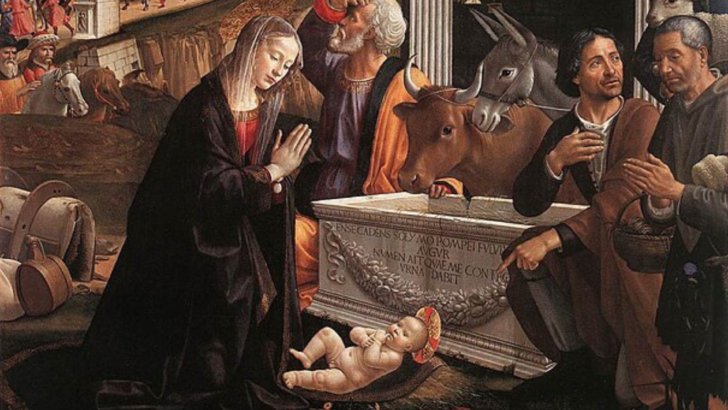Jason Conroy
For years, Ronan Collins kept up a great tradition on RTÉ radio: starting from December 8, he would play a different rendition of O Holy Night every day until Christmas. Indeed, they never start playing Christmas tunes on Radio 1 or Lyric FM before that date.
What’s so special about December 8? It’s the feast of the Immaculate Conception, which always stands near the beginning of Advent. The liturgy calls Mary the first glimmer of morning light before the dawning of a new day. She’s the first sign of Jesus’ arrival and has already all the gifts of grace that we’re looking forward to. Whenever we start getting ready for Christmas, we always start with Mary. Every holy person in the Old Testament was looking forward to Jesus, but no one did it better than her.
Celebrating
But even though the Christmas tunes have started, we can’t start celebrating quite yet. Advent songs are moodier and more pensive. They’re about keeping watch for the One who will save us in our hour of need. He will fulfil all our hopes when he comes – soon, but not yet.
The most famous Advent song is O Come, O Come Emmanuel, which is over 1,200 years old, and is full of Old Testament prophecies which are even older. It tells us about all the gifts Jesus will bring us, and all the troubles he will save us from, when he comes.
There are seven names for Jesus in this song, with seven promises about what he will do for us. He’s called “Wisdom” because when he comes, we’ll finally understand the meaning of life. He’s called the “Rising Sun” – when sin makes us fearful, confused or depressed, it’s like being in the dark, and when he comes, he chases these away like the Sun chases away the dark. He’s called “Emmanuel” which means “God is with us” – whatever we’re going through, we can be brave and cheerful, because he’s going through it with us.
But hasn’t Jesus come already? Yes: though in Old Testament times, everyone had to wait a very long time to see him, we’re lucky enough to live in the time when he has already arrived. That “holy” and “silent” night we sing of, two thousand years ago in Bethlehem, was the turning point of history, and the opening of its final chapter. We live, right now, in that climactic moment when everyone who wants can be saved because of him.
However, we still talk about his coming for two reasons:
Firstly, in Advent we are also looking forward to the end of history, which we wait for like the ending of a great story, when Jesus will come again with the angels and defeat evil once and for all. We don’t know when this will be, but Jesus taught us to always expect him soon: it could be in a thousand years, or it could be tomorrow.
Grace
Secondly, Jesus still wants to give us, here and now, all the presents – the gifts of grace – he promised us. At Christmas, it’s like Jesus is born again in Bethlehem, and it’s also like he is returning in glory too – but secretly, inside our own hearts. This is the real meaning of Christmas: that in a few days, on December 25 in the year 2024, Jesus Christ will really arrive, and we will really meet him – spiritually. He can bring us joy, just like he brought joy to the shepherds and the wise men at Bethlehem, and he can defeat the evil in our hearts, just like he will defeat all evil at his second coming. But we have to be prepared!
There are four steps to preparing for Jesus: getting the heart ready, being humble, trusting in him, and looking forward to his arrival as much as possible.
First, since he wants to live in my heart, I need to make sure my heart is full of good thoughts and deeds when he arrives. It really makes a difference whether you’ve been ‘naughty or nice’ – that’s why in Advent, like Lent, we practice charity and fight our bad habits.
But we can’t do it alone. When we try our best, we sometimes fail, and this teaches us to be humble. We can’t save ourselves, so we have to rely on Jesus to save us. So we learn to trust in him. St Therese said, “we can never have too much confidence in the good God… as we hope in him, so shall we receive.” All he needs is our trust to work miracles.
When one sports team beats another, people say “They wanted it more”: so it is with God. The more you want, the more you get! The more we want to see Jesus, the more presents of grace we’re able to receive from him when he arrives. St Catherine says “there is nothing we can desire or want that we do not find in God.” No matter what it is we’re looking for, we can find it in him when he comes; and having this certainty, we look forward to his coming all the more.
So trying our best teaches us humility, humility leads to trust, and trust makes us look forward to his coming, so that when he comes we’re ready to receive him.
Mary
Advent starts and ends with Mary because no one teaches these four crucial dispositions better than her; she is master in her field. There is a special visitor coming on Christmas night; He will leave gifts that do not disappoint. When he arrives, then there will be good reason to celebrate.
In short: get your hopes up!
Jason Conroy is a philosophy student from Co. Kildare, currently studying at KU Leuven, Belgium.



